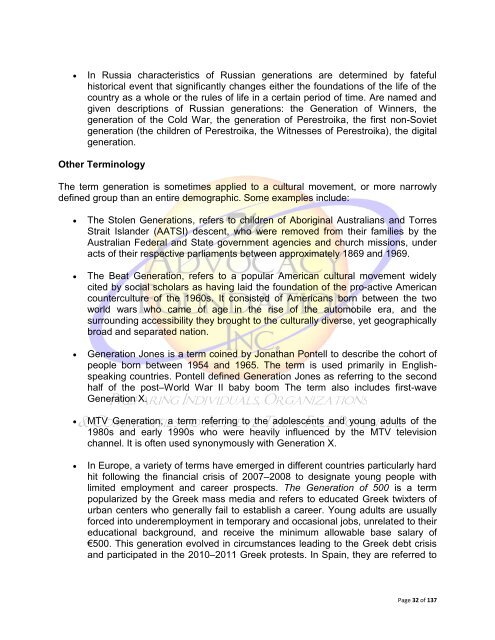Generational Progression
Generational Progression
Generational Progression
Create successful ePaper yourself
Turn your PDF publications into a flip-book with our unique Google optimized e-Paper software.
In Russia characteristics of Russian generations are determined by fateful<br />
historical event that significantly changes either the foundations of the life of the<br />
country as a whole or the rules of life in a certain period of time. Are named and<br />
given descriptions of Russian generations: the Generation of Winners, the<br />
generation of the Cold War, the generation of Perestroika, the first non-Soviet<br />
generation (the children of Perestroika, the Witnesses of Perestroika), the digital<br />
generation.<br />
Other Terminology<br />
The term generation is sometimes applied to a cultural movement, or more narrowly<br />
defined group than an entire demographic. Some examples include:<br />
<br />
<br />
<br />
<br />
<br />
The Stolen Generations, refers to children of Aboriginal Australians and Torres<br />
Strait Islander (AATSI) descent, who were removed from their families by the<br />
Australian Federal and State government agencies and church missions, under<br />
acts of their respective parliaments between approximately 1869 and 1969.<br />
The Beat Generation, refers to a popular American cultural movement widely<br />
cited by social scholars as having laid the foundation of the pro-active American<br />
counterculture of the 1960s. It consisted of Americans born between the two<br />
world wars who came of age in the rise of the automobile era, and the<br />
surrounding accessibility they brought to the culturally diverse, yet geographically<br />
broad and separated nation.<br />
Generation Jones is a term coined by Jonathan Pontell to describe the cohort of<br />
people born between 1954 and 1965. The term is used primarily in Englishspeaking<br />
countries. Pontell defined Generation Jones as referring to the second<br />
half of the post–World War II baby boom The term also includes first-wave<br />
Generation X.<br />
MTV Generation, a term referring to the adolescents and young adults of the<br />
1980s and early 1990s who were heavily influenced by the MTV television<br />
channel. It is often used synonymously with Generation X.<br />
In Europe, a variety of terms have emerged in different countries particularly hard<br />
hit following the financial crisis of 2007–2008 to designate young people with<br />
limited employment and career prospects. The Generation of 500 is a term<br />
popularized by the Greek mass media and refers to educated Greek twixters of<br />
urban centers who generally fail to establish a career. Young adults are usually<br />
forced into underemployment in temporary and occasional jobs, unrelated to their<br />
educational background, and receive the minimum allowable base salary of<br />
€500. This generation evolved in circumstances leading to the Greek debt crisis<br />
and participated in the 2010–2011 Greek protests. In Spain, they are referred to<br />
Page 32 of 137

















